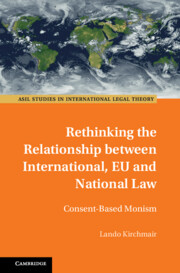Book contents
- Rethinking the Relationship between International, EU and National Law
- ASIL Studies in International Legal Theory
- Rethinking the Relationship between International, EU and National Law
- Copyright page
- Contents
- Figures and Tables
- Preface
- Acknowledgments
- Table of Cases
- Abbreviations
- Introduction
- Part I Common Theories on the Relationship of Legal Orders and Their Flaws Concerning the EU Legal Order
- 1 Dualism and Kelsenian Monism
- 2 Global Legal Pluralism and Constitutionalism
- 3 The “Autonomy” of the EU Legal Order as a Self-Standing Theory?
- 4 An Intermediate Conclusion
- Part II Consent-Based Monism
- Part III A Practical Application of Consent-Based Monism
- Conclusion
- Bibliography
- Index
2 - Global Legal Pluralism and Constitutionalism
from Part I - Common Theories on the Relationship of Legal Orders and Their Flaws Concerning the EU Legal Order
Published online by Cambridge University Press: 29 February 2024
- Rethinking the Relationship between International, EU and National Law
- ASIL Studies in International Legal Theory
- Rethinking the Relationship between International, EU and National Law
- Copyright page
- Contents
- Figures and Tables
- Preface
- Acknowledgments
- Table of Cases
- Abbreviations
- Introduction
- Part I Common Theories on the Relationship of Legal Orders and Their Flaws Concerning the EU Legal Order
- 1 Dualism and Kelsenian Monism
- 2 Global Legal Pluralism and Constitutionalism
- 3 The “Autonomy” of the EU Legal Order as a Self-Standing Theory?
- 4 An Intermediate Conclusion
- Part II Consent-Based Monism
- Part III A Practical Application of Consent-Based Monism
- Conclusion
- Bibliography
- Index
Summary
This chapter argues that neither global legal pluralism nor global constitutionalism can properly answer our question of how we can know who has the final say on the relationship between international, EU and national law. Most advocates of global legal pluralism do not sufficiently distinguish between the description of factual developments, and, as a different issue, the question of how we ought to deal with or even solve legal conflicts (based on a (common) framework) resulting from plural, overlapping legal claims. Universalist solutions, as presented by global constitutionalists, are likely to fall short of acknowledging the inevitable restrictions of context which are in place when dealing with legal norm conflicts on a global scale. Global constitutionalism has to face the burden of universality, which is an unsurmountable challenge (except for some very fundamental norms, namely ius cogens or a thin layer of global constitutionalism). With constitutional pluralism, however, we are likely to end up in a “constitutional stalemate.”
Keywords
- Type
- Chapter
- Information
- Rethinking the Relationship between International, EU and National LawConsent-Based Monism, pp. 59 - 94Publisher: Cambridge University PressPrint publication year: 2024

